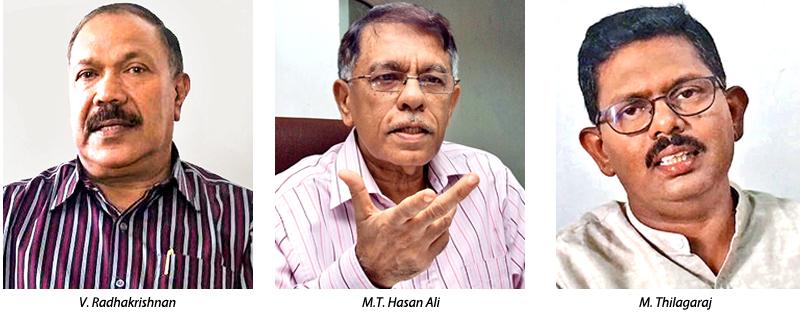
Amid the general contention over the hybrid electoral system introduced for the February 10 local government polls and criticism surfacing on a daily basis from political parties and political observers over its many shortcomings, the Sunday Observer spoke to leaders of three political parties of the minorities for their views.
State Minister of Education V. Radhakrishnan, leader of the Upcountry People’s Front (UPF), one of the three constituents of the Tamil Progressive Alliance (TPA) that ran for both, the August 2015 general elections and the February 10 local government elections as an ally of the ruling UNP, said, the setback at the LG polls is only temporary.
He blamed the new hybrid polls system for all complications and unforeseen victories to parties that otherwise would have been defeated. The new electoral system is a half-baked product
that had not gone into the diverse aspects of the polls and its final outcome. The victory of the Sri Lanka Podujana Peramuna (SLPP) led by former President Mahinda Rajapaksa is basically due to the fact that their propaganda was based on rousing communal sentiments of the majority community. Polls results in the hill country indicate that the parties that got only one or two seats ward-wise have almost reached the level of the winning parties through the PR calculation and it is apparent that something is wrong with the system. Forming
the administration of a large number of LG bodies is pending due to the want of the requisite percentage of women’s representation and election of overhang members, State Minister Radhakrishnan said.
He said, the system needs re-evaluation. Under the National Unity government the TPA has done much work for the socio-economic uplift of the plantation community and this work will continue despite the polls reversal. The TPA has won several LG bodies in the hill country and we would be forming the administration before long, he said.
Former State Minister and parliamentarian M.T. Hasan Ali, presently the Secretary General of the United Peace Alliance (UPA), a breakaway group of the Sri Lanka Muslim Congress (SLMC) that contested the February 10 LG polls said, the shortcomings of the new hybrid electoral system under which the polls were held have contributed to the current post-polls crisis on establishment of administration of a majority of LG bodies. Consultations and discussions with the civil society organizations, all political parties and political groups and other stakeholders were not held to the required level on formulating the respective Local Authorities Elections (Amendment) Act and some political parties that expressed their reservations had been forced to support the draft legislation, Ali said. The lack of intra-party democracy is one more reason that contributed to the shortcomings of the legislation, he said, adding that all defects of this nature start at party level and not in Parliament. The issues of overhung members and the impossibility of selecting women councilors against their quota of 25 percent are delaying the formation of council administration and have to be sorted out soon, he said.
Their party contested the polls after forming an alliance with the All Ceylon Makkal Congress (ACMK) led by Minister Rishad Bathuideen under the name, United People’s Alliance and contested on their ‘peacock’ symbol, Ali said. On their first appearance itself, they have done well and were in a position to form the administrations of five Pradeshiya Sabhas (PSs) in the Ampara District, with two members elected to the Colombo Municipal Council and the possibility of getting one seat each in Kalpitiya and Dehiwala, he said. Their objective is corruption free governance and national unity, Ali said. Parliamentarian Mylvagam Thilagaraj, representing the Tamil Progressive Alliance (TPA) led by Minister Mano Ganeshan and Secretary of the TPA constituent National Union of Workers (NUW) said, a set pattern in the elections, as was reflected in the February 10 LG polls, will continue until the delimitation of borders of the electorates/wards originally done by the previous government to their advantage remains, without being re-demarcated. Unless geographical and population-wise re-demarcation of electorates/wards is done, this phenomenon will continue, Thilagaraj said. To his knowledge there are electorates having a population as low as 150 while there are others with populations of about 7,000 and above and the geographical areas also differ vastly, and, strangely enough, the fund allocations are the same in most cases, he said, adding that this disparity is unfair. While counting the ballots, there are two different calculations – one on the first-past-the-post and other on the total number of votes polled by a political party or group and the allotment of the proportionate number of slots. These are matters to be reviewed, Thilakaraj said.
